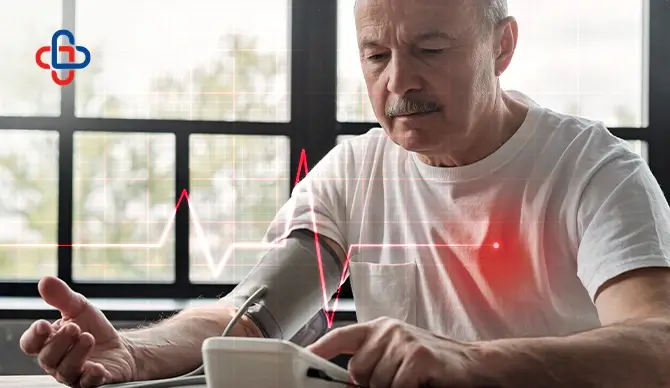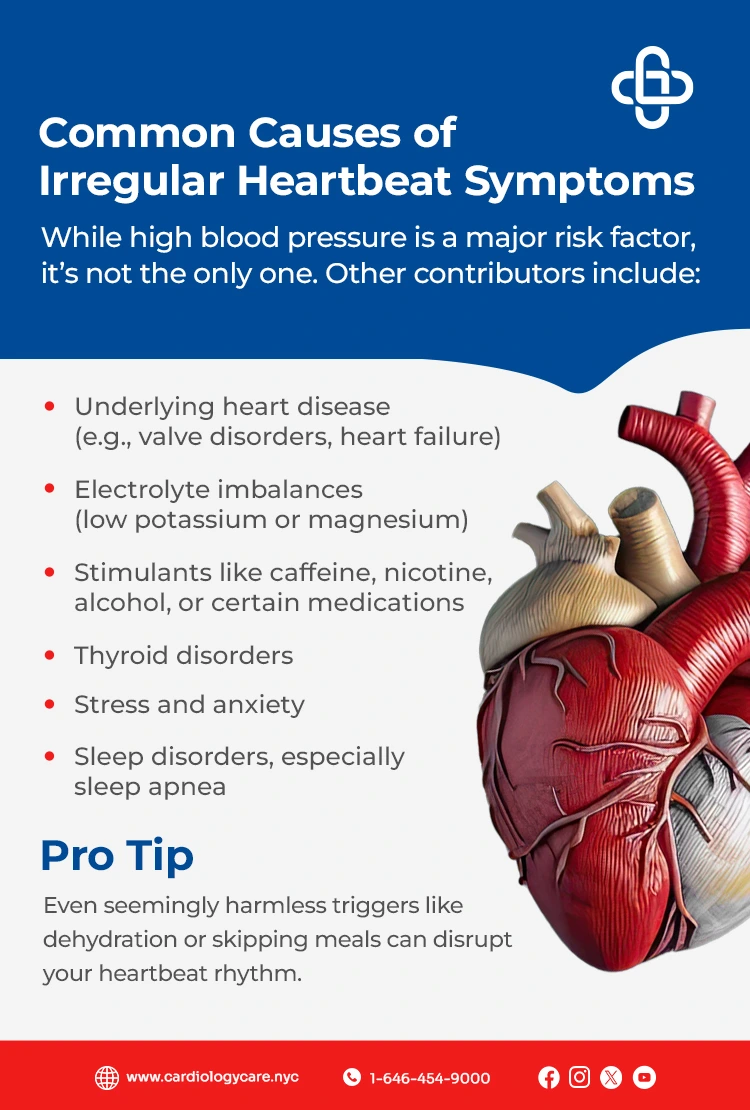Ever felt like your heart skipped a beat or maybe started racing for no clear reason?
You’re not alone. Many people with high blood pressure also experience irregular heartbeat symptoms, but the connection isn’t always obvious.
Sometimes it feels like a flutter. Other times, your heart might pound or thump out of nowhere. Is it anxiety? Is it dangerous? And could your blood pressure be to blame?
Table of contents
What Is an Irregular Heartbeat?
An irregular heartbeat, or arrhythmia, happens when the electrical signals that control your heart’s rhythm get disrupted. Think of your heart like a drummer in a band; if the beat skips, races, or becomes chaotic, the whole performance suffers.
There are many types of irregular heart rhythms, including:
- Atrial fibrillation (AFib): Rapid, irregular beating from the upper chambers
- Premature beats: Early contractions that feel like a skipped beat
- Bradycardia: Slower than normal heart rate
- Tachycardia: Faster than normal heart rate
Symptoms of Irregular Heartbeat:
- Fluttering in the chest
- Racing or pounding heart
- Skipped beats
- Dizziness or light-headedness
- Chest discomfort
- Shortness of breath
Not all arrhythmias are dangerous, but some can lead to serious complications. Recognizing irregular heartbeat symptoms is the first step.
Can High Blood Pressure Cause Irregular Heartbeat?
Short answer? Yes, it can. When your blood pressure is consistently high, it puts extra strain on your heart. Over time, this pressure causes the heart muscle, especially the left ventricle, to thicken and stiffen (a condition called left ventricular hypertrophy).
This structural change can interfere with the heart’s electrical system and contribute to abnormal heart rhythms.
High blood pressure also:
- Reduces blood flow to heart tissue
- Increases inflammation
- Raises the risk of atrial fibrillation, a common and serious arrhythmia
Common Complaints:
- My heart flutters when I’m stressed.
- I feel palpitations when my pressure spikes.
- I have high blood pressure, and sometimes my heart races.
These may be signs of heart palpitations and high blood pressure working together.
Common Causes of Irregular Heartbeat Symptoms
While high blood pressure is a major risk factor, it’s not the only one. Other contributors include:
- Underlying heart disease (e.g., valve disorders, heart failure)
- Electrolyte imbalances (low potassium or magnesium)
- Stimulants like caffeine, nicotine, alcohol, or certain medications
- Thyroid disorders
- Stress and anxiety
- Sleep disorders, especially sleep apnea
Pro Tip:
Even seemingly harmless triggers like dehydration or skipping meals can disrupt your heartbeat rhythm.
When to Worry About Irregular Heartbeats
While occasional flutters or skips aren’t always serious, there are clear red flags that mean you should see a cardiologist:
- Fainting or near-fainting
- Chest pain or pressure
- Shortness of breath
- Persistent or worsening palpitations
- Irregular beats that happen often or last several minutes
If you have high blood pressure, don’t wait for these signs to escalate. Abnormal heart rhythms can increase your risk of:
- Stroke
- Heart failure
- Sudden cardiac arrest (in rare cases)
How Are Irregular Heart Rhythms Diagnosed and Treated?
Your care team at Cardiology Care NYC uses advanced tools to find the cause of your symptoms:
Tests:
- Electrocardiogram (ECG) Test: Captures your heart’s electrical signals
- Holter Monitor: 24-48 hour portable heart rhythm tracking
- Event monitor or implantable loop recorder: Longer-term monitoring
- Echocardiogram Test: Ultrasound to evaluate heart structure
- Stress Test: Checks how your heart performs under exertion
Treatments:
- Medications (to control rhythm, rate, or blood pressure)
- Catheter ablation (minimally invasive procedure for persistent arrhythmias)
- Lifestyle changes (diet, exercise, sleep, stress management)
Conclusion
High blood pressure can raise your risk of serious irregular heart rhythms, but early detection makes a big difference.
If you’re feeling irregular heartbeats and have hypertension, it’s time to get checked. Cardiology Care NYC offers expert evaluations and personalized treatment. You may also benefit from a blood pressure screening or a full heart health screening. Let’s keep your heart in rhythm.
Frequently Asked Questions
Can irregular heartbeat symptoms come and go throughout the day?
Yes, some arrhythmias are intermittent and may occur at different times—especially during stress, after caffeine, or while lying down.
Can dehydration cause irregular heartbeat?
Yes. Low fluid levels can disrupt electrolyte balance and affect your heart’s electrical system, triggering palpitations or arrhythmias.
Does irregular heartbeat always mean heart disease?
Not necessarily. While some irregular heartbeats signal heart problems, others are triggered by lifestyle factors, medications, or hormones.
Can I exercise with irregular heartbeat symptoms?
It depends on the type and cause. Always consult a cardiologist before starting or continuing a workout routine with known rhythm issues.
How does salt intake affect irregular heartbeat?
High sodium levels can raise blood pressure and increase fluid retention—both of which may stress the heart and worsen rhythm disturbances.
Source
- American Heart Association – High Blood Pressure, Atrial Fibrillation and Your Risk of Stroke
- Temple Health – When Should I Worry About an Irregular Heartbeat?
- ACIBADEM Healthcare – Heart Palpitations and High Blood Pressure
- Knowridge – What is the link between high blood pressure and heart palpitations
- KARDIA – AFib and Hypertension
Disclaimer
This blog is for informational & educational purposes only and does not intend to substitute any professional medical advice or consultation. For any health-related concerns, please consult with your physician, or call 911.

